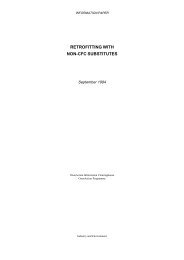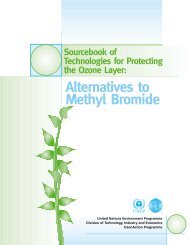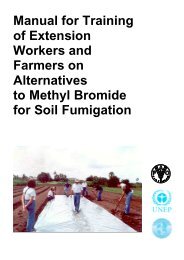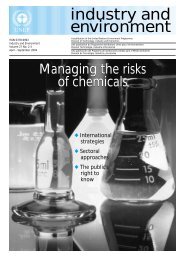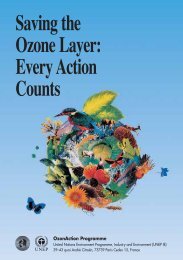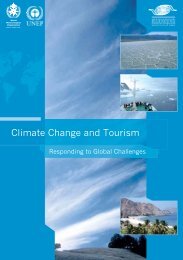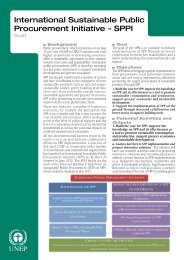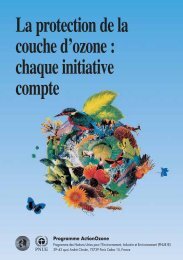Mining and Sustainable Development II - DTIE
Mining and Sustainable Development II - DTIE
Mining and Sustainable Development II - DTIE
Create successful ePaper yourself
Turn your PDF publications into a flip-book with our unique Google optimized e-Paper software.
<strong>Mining</strong><br />
◆ Have participants review their own emergency<br />
plan for adequacy relative to a coordinated<br />
response;<br />
◆ Identify the required response tasks not covered<br />
by the existing plans;<br />
◆ Match these tasks to the resources available<br />
from the identified participants;<br />
◆ Make the changes necessary to improve existing<br />
plans, integrate them into an overall community<br />
plan <strong>and</strong> gain agreement;<br />
◆ Commit the integrated plan to writing <strong>and</strong><br />
obtain approvals from local governments;<br />
◆ Communicate the integrated plan to participating<br />
groups <strong>and</strong> ensure that all emergency<br />
responders are trained;<br />
◆ Communicate the integrated plan to the general<br />
community.<br />
When UNEP first developed the APELL<br />
process, it was recognised that various countries<br />
differ in culture, value systems, community infrastructure,<br />
response capabilities <strong>and</strong> resources, <strong>and</strong><br />
in legal <strong>and</strong> regulatory requirements. Given the<br />
variety of local situations that exist, the APELL<br />
steps provide the basic concepts for the development<br />
of action plans based on local community<br />
awareness of potential dangers <strong>and</strong> the preparation<br />
of unique emergency response plans. While<br />
the objectives remain unchanged, the mechanics<br />
of the development <strong>and</strong> operation will change<br />
from place to place, in accordance with specific<br />
local conditions <strong>and</strong> requirements.<br />
Scope<br />
Large <strong>and</strong> small mining operations should be<br />
equally concerned with community involvement<br />
in contingency planning <strong>and</strong> being fully prepared<br />
for emergencies, but it is likely that there is a certain<br />
size of mine below which APELL would be<br />
difficult to implement. Although small scale <strong>and</strong><br />
artisanal mining operations have the potential to<br />
cause off-site damage, particularly when they are<br />
highly concentrated in a relatively small area, 4 the<br />
organisation <strong>and</strong> resources required to move<br />
through the APELL process would be lacking. In<br />
some areas, however, some of the activities of artisanal<br />
miners are becoming centralised through cooperatives<br />
designed to increase recoveries, improve<br />
safety <strong>and</strong> reduce impacts to the environment,<br />
<strong>and</strong> where these schemes are operating successfully,<br />
introducing the APELL process to the co-operative<br />
group may be feasible.<br />
The Benefits of Implementing APELL<br />
<strong>Mining</strong> companies have become much more<br />
transparent <strong>and</strong> proactive in their relationships<br />
with stakeholders. This is in recognition of the<br />
legitimate interests of local communities, not only<br />
in the employment <strong>and</strong> business opportunities<br />
generated by the presence of a mine in their area,<br />
but also in the environmental <strong>and</strong> social impacts<br />
<strong>and</strong> pressures which it can bring. Communities<br />
have a right to know what they are exposed to <strong>and</strong><br />
increasingly they expect to be consulted <strong>and</strong>, if<br />
they have well-founded concerns about certain<br />
aspects, to have an influence on the way operations<br />
are managed.<br />
Companies underst<strong>and</strong> that support for or<br />
opposition to a mine from civil society <strong>and</strong> communities<br />
can be highly influential in decisions<br />
about whether <strong>and</strong> under what conditions a mine<br />
can operate. They therefore need to establish trust<br />
<strong>and</strong> support based on effective two-way communication<br />
with local communities <strong>and</strong> other stakeholders.<br />
Trust, support <strong>and</strong> an underst<strong>and</strong>ing of the<br />
operation amongst the local community will be<br />
severely tested if there is a major accident with<br />
potential or actual off-site impacts. If trust exists,<br />
the company will be better placed to communicate<br />
effectively in the case of an emergency as well<br />
as to recover more quickly from one. If a base of<br />
awareness <strong>and</strong> trust does not exist, the consequences<br />
of an accident for the company will certainly<br />
be worse <strong>and</strong> more long-lived.<br />
The APELL process should bring benefits in at<br />
least three ways:<br />
◆ to reduce the risks of accidents <strong>and</strong> to reduce<br />
the impacts of accidents as a result of the process<br />
of hazard <strong>and</strong> risk identification, risk reduction<br />
<strong>and</strong> risk communication undertaken<br />
◆ to help build relationships between the mine<br />
<strong>and</strong> the community which will be of benefit over<br />
the long term<br />
◆ to assist awareness <strong>and</strong> underst<strong>and</strong>ing of the<br />
operation <strong>and</strong> its management which should generate<br />
the confidence, trust <strong>and</strong> support which<br />
companies need whether or not they experience<br />
an accident.<br />
<strong>Mining</strong> companies <strong>and</strong> management have<br />
many important priorities which compete for<br />
attention <strong>and</strong> resources. How important is APELL<br />
in the scheme of things for companies? Individual<br />
companies will make their own decision about<br />
that, but they will no doubt take into consideration<br />
that accidents <strong>and</strong> their consequences, though<br />
rare, do happen with potentially disastrous consequences;<br />
that a mine is often part of a community<br />
for a generation or more <strong>and</strong> is often the dominant<br />
operation in that community; <strong>and</strong> that the industry<br />
is coming off a base of having a trust <strong>and</strong> a<br />
knowledge deficit. These considerations should<br />
make APELL an option worth pursuing.<br />
How APELL could have made a<br />
difference<br />
As an example where the effects of an accident<br />
may have been significantly reduced had local<br />
communities been more knowledgeable because<br />
of their involved in an APELL process is the<br />
Yanagocha case in Peru. 200 kilograms of mercury<br />
spilled from an open flask on a truck as it passed<br />
through a number of villages en route from the<br />
Yanagocha gold mine. Only 66 kilograms of the<br />
local material was recovered. As well as using it in<br />
local medicine, the local people believe that the<br />
mercury contains gold. Many therefore heated the<br />
mercury in their homes, with little ventilation to<br />
“obtain the gold”. As a result, several hundred<br />
people were treated in medical centres <strong>and</strong> hospitals<br />
as a result of exposure to toxic mercury fumes.<br />
In this case, had an effective communication program<br />
regarding the hazards <strong>and</strong> potential health<br />
effects arising from contact with mercury been<br />
conducted, it could have influenced behaviours<br />
<strong>and</strong> health impacts should not have arisen.<br />
Notes<br />
1 T. Mudder <strong>and</strong> M. Botz<br />
2 Eriksson <strong>and</strong> Adamek, 2000<br />
3 T. Mudder <strong>and</strong> M. Botz<br />
4 such as at Serra Pelada in Brazil ◆<br />
70 ◆ UNEP Industry <strong>and</strong> Environment – Special issue 2000



